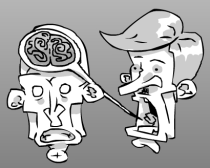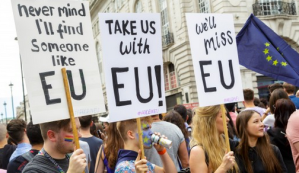The third in this series on democracy and the EU’s lack of it. See On Democracy-1 and On Democracy-2 first.
Two quotations offer evidence that supports our claim that the EU is founded on contempt for its member nations and disdain for its citizens.
“Europe’s nations should be guided towards the superstate without their people understanding what is happening. This can be accomplished by successive steps, each disguised as having an economic purpose, but which will eventually and irreversibly lead to federation.” (attributed to Jean Monnet.)
I have never understood why public opinion about European ideas should be taken into account.” Attributed to Raymond Barre, former French premier and European commissioner.
 These quotations characterise the attitude that underpins the whole European Union project. The edifice is a castle built on the sands of elitist disdain for the peoples of Europe and their (more-or-less) democratic national regimes. (from More High and Mighty)
These quotations characterise the attitude that underpins the whole European Union project. The edifice is a castle built on the sands of elitist disdain for the peoples of Europe and their (more-or-less) democratic national regimes. (from More High and Mighty)
The EU needs to decide whether or not it wishes to be a truly democratic organisation. So far it has decided against that idea, mainly because of its continuing fixation on its progress towards ruling its member states as a supra-national government (euphemistically known as ever closer union). This in turn is based on the EU’s disdain for nations, their governments and their citizens which goes back to the foundations of the Union and its predecessor organisations. (from Carry on Macron)
We have shown consistently throughout this blog that the EU’s ideology of supra-national government, growing as it does out of disdain for democracy and coupled with a culture of deceit, is bound to lead to discontent and disenchantment with the source of the discontent – the EU itself. There is simply neither logical nor causal link from autocratic government to the welfare of the governed.
We draw comfort and confidence in democratic government from the same source from which EU leaders draw their opposite conclusion. The rejection by voters of strident nationalism in Austria, the Netherlands and France, and indeed in the UK (witness the collapse of UKIP) indicates clearly that voters understand more than they are credited with, despite vigorous attempts to persuade them that they need to be governed by autocrats and to be deprived of any real say in how they are governed. (from View from the Parapet)
 Why and how have reasonably honourable people, including previous UK Prime Ministers, deceived us? It is because they are patricians who believe they are acting for our good, in spite of our weak minds. This is true of EU leaders in general, as their high-handedness often demonstrates
Why and how have reasonably honourable people, including previous UK Prime Ministers, deceived us? It is because they are patricians who believe they are acting for our good, in spite of our weak minds. This is true of EU leaders in general, as their high-handedness often demonstrates
“Europe can only work if we all work for unity and commonality … Only then will leaders of the EU institutions and national governments be able to regain the trust of Europe’s citizens in our common project … What our citizens need much more is that someone governs.” (Jean-Claude Juncker, from his State of the Union address to the European Parliament in September 2016.)
As for “someone governs”, that rips through the veil to reveal the naked truth, that J-C (and his like) want to govern us all, forever, without recall. At least he doesn’t pretend that this is what we want, just that it’s what we need (and therefore should want). (from Attitudes and Ideology)
 The principal motivation behind the founding of the European Union was to end the bloody conflicts between the competing empires of Europe. The principal means for doing this would be by forging them into a single nation which could not then be at war with itself. Even at the fetal stage its procreators knew there would be reluctance and resistance, so a degree of subterfuge was necessary and, especially after the rise of the 20th Century’s dictators via popular votes, a further modus was required – the appointment of wise councillors to guide the people rather than allow them to make bad choices or frustrate the grand project. (From Gawd Strewth!)
The principal motivation behind the founding of the European Union was to end the bloody conflicts between the competing empires of Europe. The principal means for doing this would be by forging them into a single nation which could not then be at war with itself. Even at the fetal stage its procreators knew there would be reluctance and resistance, so a degree of subterfuge was necessary and, especially after the rise of the 20th Century’s dictators via popular votes, a further modus was required – the appointment of wise councillors to guide the people rather than allow them to make bad choices or frustrate the grand project. (From Gawd Strewth!)
If the EU was an enlightened idea it would want the best future for its member nations and citizens plus mutually beneficial cooperation with others. It is overwhelmingly obvious that this is not the case
Deceitful propaganda efforts do not signal an intention to reform the EU and should not be taken seriously. (from Influence or Impotence?)
 Conclusion
Conclusion
Our blog explains, in considerable detail and from many angles, why the EU is a risky project and why the UK should leave it. In these posts on democracy we have sketched some key points and provide links to our posts that look at these points in more detail.
Question A: What proportion of the electorate would assent to these propositions?
- A democratic government should be accountable to its citizens.
- An effective measure of accountability is the proportion of the electorate who vote.
- The main purpose of a democratic election is to retain or dismiss the current government.
Answer: We believe that a large majority of Britons would agree to these.
Question B: Why do we want the UK to get out?
Some answers:
- The goal: the overriding aim of the EU is to become a federal government not subject to the expectations of the people they rule. This aim is well on the way to being achieved and already the momentum is such that there is no power that can change its direction.
- The design of the EU is such that it cannot reasonably be expected to achieve what it claims to be its aims, or even to survive its design faults.
- Governance: we do not want to be governed by an unelected regime over which we (the people) have no control.
 Obscured ideology: the fundamental aim of the EU is to achieve supra-national governance of Europe’s nations. This ideology is veiled behind a wall of propaganda, specious claims and outright deceit.
Obscured ideology: the fundamental aim of the EU is to achieve supra-national governance of Europe’s nations. This ideology is veiled behind a wall of propaganda, specious claims and outright deceit.- Politics v. Pragmatics: The actions of EU institutions are prioritised by political considerations (and led by ex-politicians) in the light of its ideology. Experiment and evidence are disdained.
- Jurisdiction: the ECJ is the legal instrument and protector of the ideology and judgements are based on treaties not on precedent, unlike in the UK).
- Finance/economy: EMU is the core instrument of federalism; the eurozone has captured the governance of its members. Britain’s opt-out of the common currency illustrates its half-hearted membership.
- Irreversibility: Only an ideology needs to make its progress irreversible; decisions, actions, laws and regulations are based on ideology, so cannot be reversed. Competences are handed up but never down. Progress is characterised by fits and starts but the trend is one way.
- Elections: EU mandarins seem to view low voter turn-out as a manifestation of voter ignorance, and they blame the governments of their member states for not doing enough to portray the project in a friendly way.
- Brexit: Negotiating directives were mandated by the Commission to protect the ideology and its products; it is primarily a political activity. Negotiations are a political game to protect the ideology and the federal goal of the Project.
The EU has been greatly misrepresented, principally by itself. It was poorly conceived, poorly designed and poorly implemented. This has led inevitably to poor outcomes, especially for Britain.
 The EU is a good idea gone bad; too many supporters argue for the good idea and do not want to consider the bad reality.
The EU is a good idea gone bad; too many supporters argue for the good idea and do not want to consider the bad reality.
Brexit is not about the benefits to Britain of leaving but about the risks of staying in the EU.
One thought on “On Democracy-3”